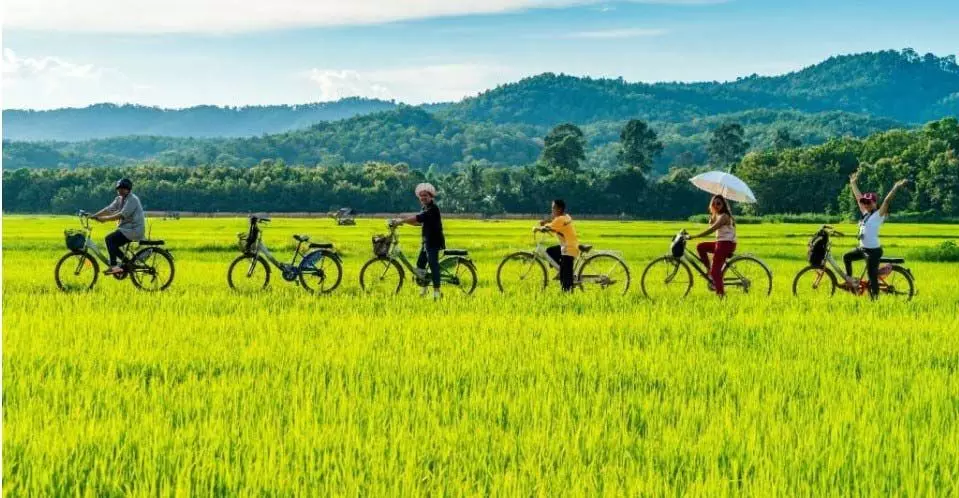Live
- CM Chandrababu Naidu to Attend Christmas Celebrations in Amaravati Today
- CM Revanth to Review Projects with Senior Officials Today
- Fix Ozone Layer Depletion
- Harish Rao to Visit Medak Today for Centenary Celebrations
- Irregularities in TUDA under vigilance scanner
- ‘Pushpa-2’ row: Celebs & politicos fail to act fairly
- Learn from fighting spirit of women bravehearts: VHP VP
- BJP MP Arvind, MLA Sanjay Kumar meet CM Revanth
- Rapido partners with L&TMRHL to provide discounted rates
- Kisan Diwas 2024: A Day Dedicated to honor our Farmers.
Just In

Responsible Travel is more than only a way of travel. It is really about minimising the negative impacts of tourism
I often face a significant dilemma about travel – I am passionate about travel and want to explore the world, but it is not good for my carbon footprint. Nevertheless, in my wanderlust, I try to keep my travel sustainable by choosing experiences that prioritise the protection of local culture, as well as environment.
I travel on public transport as much as possible. This year about 66% of travel was by bus, train and ferry, 5% carpooling, thus taking fewer flights and travelling for longer as well.
Group tourism like package holidays, and frequent air travel are not sustainable ways of travel, which I have managed to avoid till now.
Opting to stay in locally-run guesthouses and eat in locally-run restaurants, carrying reusable water bottles and bags to save on plastic waste are just a few of the ways I have adapted to minimise negative impacts of travel and make a positive one.
I have my steel straw and spoon always with me including the cleaning kit. I go on public transport as much as possible; using metro is a boon where available or shared cabs while on intra city exploring. I buy my everyday things from a local vendor mostly. I try looking for local food markets that sell loose fruit that have no packaging. I often order the right amount of food that's good for my travel partners instead of placing an order for a full course meal and wasting it. I seldom use the air conditioner even if the provision is available in my room unless it's uncomfortable.
To be green, I don't wear anything leather or make any purchases that include it. I carry my own quick-dry compact, light bath towel, which is highly absorbent and easy to pack. It's low on maintenance and has been as good as new even after five years of travel use. I take shorter showers by requesting the guest house to arrange bucket and mug rather than indulge in fancy jet showers that are provided. I consciously pack light by limiting the number of clothes, carrying only a pair of shoes and sandals.
I also believe if we all care a little, we can help locals make their livelihood better. Responsible travel benefits everyone; the world, people and its ecology. Love of travel and passion for our earth is equally important. Reducing carbon footprints wherever we move by, finding sustainable ways to do so is the key to a better now and future.
In recent trips I had an opportunity to reside in local home-stays at Panhala, Tehri-Garhwal, Varanasi and Mashobra. The experience of spending time in the local farm in the Himalayas and discussing various methods for rainwater harvesting, solar fencing and organic waste composting was mutually interesting and time well spent. It was also one of my best traveling experiences ever. It let me understand how travel connects us on so many levels and gives us the chance to improve the lives of others.
During my visit to Panhala near Kolhapur too, the locals welcomed me with freshly made millet bread and spicy lentil curry. priced as low as INR 50 the joy was equal for the host as well as the guest.
Even while travelling between countries where Indian passport holders are allowed visa on arrival through limited open border routes I have used public rail/road transport. I travelled from Thailand to Laos by train and from Laos to Cambodia by bus instead of picking a direct flight. While there is no better way to see the countryside it also contributes to responsible travel.
As a certified 'eco tourism volunteer' I am able to provide effective assistance to the forest department in matters of conservation by diffusing information. In the last five year have had an opportunity to work in the Nilgiris biosphere, Bhimgad Wildlife Sanctuary and Dandeli forest reserve.
I realised that the sites of historical relevance, monuments and culture is concentrated in the old parts of the city. While making my itinerary I look for places to stay in these areas and I find that some of the residents have modified/renovated their homes to welcome at least few tourists/travellers to stay. This is not only an unique experience but helps in boosting the local economy by generating critical revenue. A win-win for everyone.
Usha is a semi nomad Architect from Hyderabad, India with a strong passion for responsible tourism, and green environment. She has travelled to over 23 countries and 23 states in India

© 2024 Hyderabad Media House Limited/The Hans India. All rights reserved. Powered by hocalwire.com







